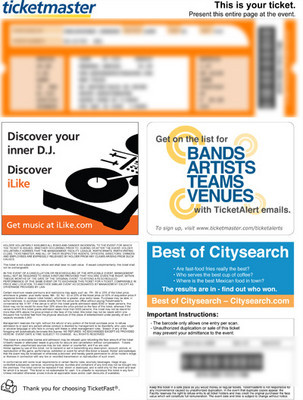Criminals can take advantage of home-printed event tickets

With each step he took toward the entrance of the House of Blues at Mandalay Bay, the 16-year-old boy grew more excited. He was finally going to see Flogging Molly, the rock band whose show on March 15 had been sold out for weeks.
It fell to the ticket-taker to break the bad news. The boy’s ticket was no good. Its bar code scanned as invalid.
The benefits of printing concert and sporting tickets at home are obvious: no waiting in will-call lines, no praying that an envelope will arrive in time for the event.
Clicking "print" after making an online purchase is the extent of one’s headaches.
However, the same technology makes it more convenient for criminals to prey on fans disappointed to find themselves shut out of popular events.
"It’s simply an issue of going to the Xerox machine," said Sean Pate, head of communications for ticket broker Stubhub.com. (In addition, the number of tickets printed can simply be changed from "1" to any other number.)
Every home-printed ticket contains a bar code valid for one seat. So if multiple copies are made and presented to a venue, the first one scanned is valid. The others aren’t.
"If someone’s selling a paper ticket to you, you’re going to have to be very concerned about whether that is legitimate," Pate said.
The Flogging Molly fan’s paper ticket was purchased from a man standing outside the venue. (Note: Hard tickets also can be bogus if purchased outside a venue — if that venue allows patrons to re-enter and it scans tickets instead of tearing them.)
"I don’t know how much he paid," said House of Blues box-office supervisor Zainab Ali, noting that the venue does not permit on-premises sales for more than face value. "But he was asking us why it wouldn’t scan. And we showed that it had already scanned 20 minutes earlier."
According to an informal R-J survey of entertainment venues, approximately 20 percent of concert and sports tickets are now printed at home. Executives at the House of Blues and The Joint at the Hard Rock Hotel estimated that about 20 pairs of those tickets turn up invalid each year. (Representatives for MGM/Mirage, Harrah’s, the Pearl at the Palms and UNLV Tickets declined to provide estimates. Officials from the Orleans Arena did not return phone calls.)
There is good reason to suspect that the number of fraudulent home-printed tickets may be underreported, however.
"If security scans it and it comes up invalid," Ali said, "(the ticket-holder) won’t come up to us and complain, because they know it’s a fake ticket."
In 2005, approximately 250 U2 fans showed up to a sold-out, three-night stand at Boston’s FleetCenter with home-printed tickets that couldn’t grant them access, according to a report in Rolling Stone magazine. That same year, more than 100 Green Day fans were similarly shut out of Verizon Wireless Arena in Manchester, N.H.
In March, according to a report by WNYW-TV in New York, a man purchased home-printed New York Yankees tickets from an eBay seller with a good feedback rating. (The online auction site touts its feedback system as protection against fraud.)
The man’s tickets were invalid, and an updated check on the eBay seller showed a significant drop in his rating, with many irate customers accusing him of selling bogus tickets.
"I wouldn’t tell you that we never get somebody walking up to the venue that’s had an issue like that," said Michael See, director of UNLV Tickets, whose tickets for the Thomas & Mack Center, Sam Boyd Stadium and the Cox Pavilion are about 20 percent home-printed.
"Of course it happens," he said. "It doesn’t happen a lot, but it definitely happens."
For big events — such as popular boxing bouts — See said the Thomas & Mack doesn’t offer home-printing, because of the possibility of abuse.
"If you can print out a piece of paper that’s worth 700 bucks, the temptation to photocopy that is out of this world," See said. "So we’ll only offer specific delivery methods like Priority Mail."
The potential for home-printing fraud actually makes the technology less convenient for people who find themselves faced with a change in plans and paper tickets they can’t return for a refund.
"They make it seem like the default choice when you purchase from Ticketmaster, and you simply think, ‘Yeah, how convenient,’ " said Brian Cole of San Diego, who was having a tough time last week using Craigslist to sell the single home-printed ticket he purchased to see Bob Dylan’s Sept. 1 show at The Joint.
"In the end, it just serves to limit consumers’ options," Cole said.
Indeed, listings on Craigslist and eBay for home-printed tickets are easy to spot. They’re the only ones that don’t prominently advertise "hard tickets."
"The people who are buying those tickets definitely tend to prefer a hard ticket, because it’s very hard to fake," Pate said.
Contact reporter Corey Levitan at clevitan@reviewjournal.com or 702-383-0456.